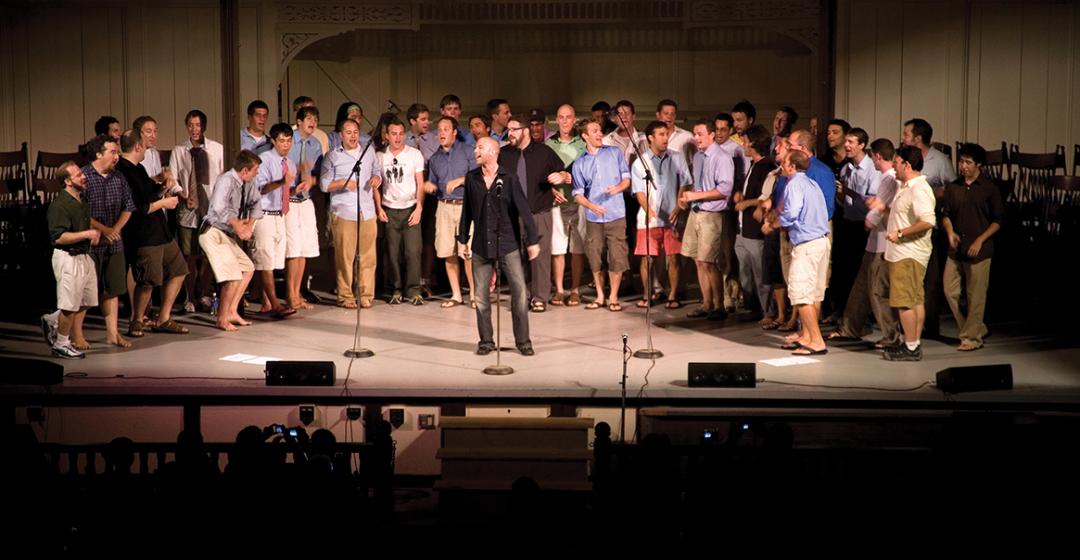Andrew Lefkowits ran onto the Tabernacle stage through the rear door six minutes into the Vineyard Sound reunion concert wearing shorts, a yellow button-down shirt, an overnight beard, and a backpack hooked on his shoulder. From the audience, you could see him crouch a bit as he darted along the back wall to a wooden chair just left of center stage. Downstage, Brendan Dolan of the 2007 ensemble was singing the lead on its swinging, foot-stomping rendition of “Captain’s Song,” by Jinx, a hit with Island audiences that went back fifteen summers to the beginning of the group.
Now, after running up from the ferry, across downtown Oak Bluffs, and through the Camp Ground, Andrew suddenly found himself seated among more than forty of his fellow Vineyard Sound alumni, some of whom he hadn’t seen since the tenth reunion concert five Julys before. Most of them couldn’t believe he’d made it. And there were twelve hundred people out there in the dark. Some of them remembered Andrew Lefkowits too. From across the Tabernacle, you heard shouts of recognition as he made his dash and took his seat.
Andrew had sung with the Vineyard Sound – the summertime, all-male, college a cappella group that was celebrating its fifteenth anniversary on the Island that last Sunday night in July – from 1999 through 2001. Now came the time for the guys from his years with the group to sing. From Logan Airport that afternoon, and on the bus clipping down to Woods Hole a couple of hours before, Andrew had sent a text message to Sam Bigelow, another alumnus from those years, to find out what songs they were going to do and what parts Andrew was down for. Now thirteen men from the Vineyard Sound summers of 1999 through 2001 came downstage to piercing whistles and cheers and formed a U.
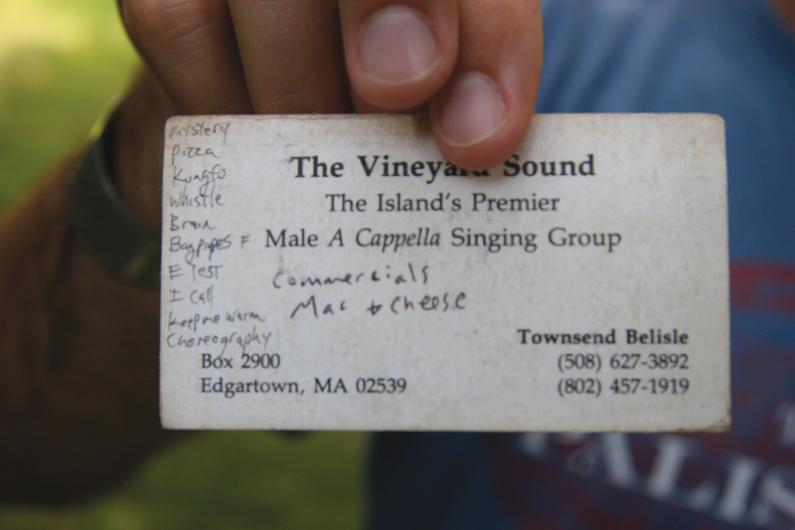
“At that point,” says Andrew, “I had been awake for nineteen hours or so. I had had probably four hours of sleep the night before. Maybe not even.” The guys were about to sing songs they hadn’t sung together since that last reunion concert five summers before – and Andrew had missed the warm-up that afternoon and the rehearsal on the shady green around the Tabernacle just a few hours earlier. The first song was the catchy, driving “Girlfriend,” by Matthew Sweet.
Right then it occurred to Andrew: “I didn’t really remember how that song went at all.” He turned to Sam Bigelow. “I was, like, ‘Sam, Sam, how does this song go?’ Sam leaned in to Andrew: “He went, ‘Dow, digga-digga-dow.’ I went, ‘Oh, yeah, yeah, yeah, got it. Okay, no problem.’” Just before he sang that first background “dow,” it occurred to Andrew how amazing it was that so many fellow Vineyard Sound alumni had traveled from as far away as Washington, Los Angeles, and San Francisco to be at the Tabernacle on this reunion night. But Andrew had amazed those guys even more. For at midnight the night before, he had been working as a sound engineer at a concert by Naturally 7, a professional a cappella group with a worldwide following. His friends from D.C. and L.A. and S.F. understood why he’d troubled to come. But anyone else who knew what Andrew Lefkowits had been through that day had to wonder: What is it about singing a cappella on the Island that would bring a guy back to the Vineyard Sound on a sunrise flight from Paris?
Well, there’s a light coming from my window, and it shines down on the street.
Yes, they know they’re hokey. To stand up every night in a Vineyard Vines uniform of khaki shorts, bright Oxford shirt, printed tie, and flip-flops and sing with no instruments between you and your audience but a tuning fork, you’d pretty much have to be. “I’m a huge music nerd,” says Owen Bennion, who was headed into his junior year at Wesleyan University and who sang parts from tenor to bass with the Vineyard Sound last year. It was a point that many Vineyard Sound singers made about themselves as the reunion summer played out: “I like to think of myself as cool, but really I’m a nerd in pretty much every aspect of my life,” Owen adds. “I’m a science major thinking about lab work. I work as a computer tech. And I’m just kind of nerdy all over the place.”
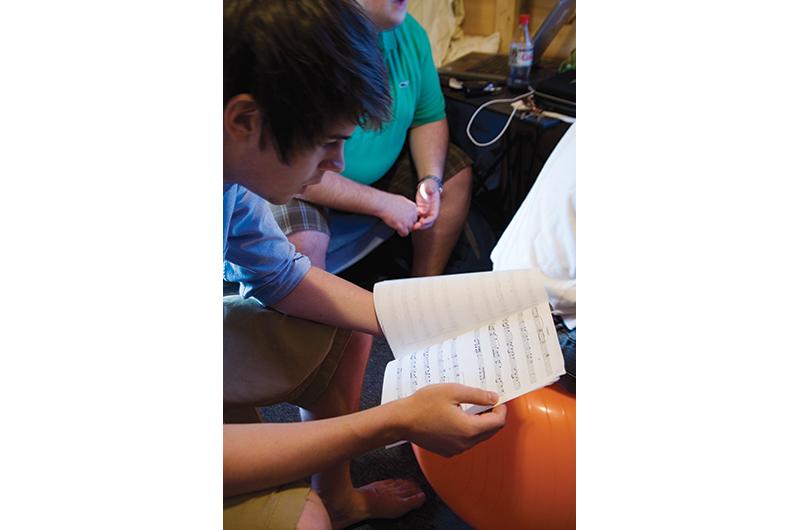
So nerds, sure, but stars also: Like previous Vineyard Sound ensembles going back to the beginning, Owen and the rest of the 2007 singers were the most popular recurring live-entertainment act on Martha’s Vineyard last summer, performing a regular schedule at churches and one restaurant across the Island five days a week. Between the end of June and the middle of August, they sang eighty-five shows for more than ten thousand people, selling out more than three-quarters of their hour-long concerts and pulling in as much as $150 per singer per night from a tip basket and suggested donations of $8 per adult and $5 per child. At private parties – weddings, birthdays, gallery openings, and political events – they commanded $500 for an hour-long show.
But what makes college a cappella work in this particularly preppy, self-aware way on the Vineyard? (“This surreal world where everyone in the group dresses up in, like, pastels, and it’s okay,” notes Ryan Earls, a rookie member of the Vineyard Sound last year, majoring in pharmaceutical studies at the University of Connecticut.) Simple, says David Baker, the 2007 music director from Skidmore College: “Just imagine being here on the Island with your family, spending the whole day at the beach – what are you going to do in the evening? You can go to dinner, maybe a movie, but you can go to a movie when you’re not on the Island. What’s different about the Island? Well, there’s us. This is the last thing you’d expect ten college men to be doing – probably.” Billy Flanagan, from the College of William and Mary, who was last year’s financial manager, adds: “Doo-wop, the Beach Boys – it has that summery feel about it. It’s the perfect kind of music to do. It reaches parents, and by reaching the parents, it reaches the kids.”
The concerts are no-frills affairs. At the first show at St. Andrew’s Episcopal Church in Edgartown on June 16 last year – a twelve-song set ranging from a cartoon medley to Squeeze, and performed after just two weeks of rehearsal – the guys ran in hollering through a side door, waving their hands over their heads like children hurtling onto a playground at recess. It was the first of two shows that night, the one specifically tailored for kids, and the pews were filled. An overflow of parents – Vineyarders as well as visitors – lined the floor of the center aisle. Some of their children sat cross-legged at the feet of the singers, thrilled to be so close. The young men sighed their ooh’s and aah’s through “Here, There, and Everywhere” and mugged their monstrous way through the kitschy, calypso “Zombie Jamboree.” The skill and the boyishness of that first gig set a standard for the summer ahead: “We can interact with the crowd,” says David Baker. “We can jump off the stage, go up to a kid, and sit right next to him and sing our solo to him.It’s a win-win situation. It’s kind of like, if you go to a Disney movie, there’s jokes that only adults get, but they’re not dirty, and then there’s comedic things that the kids love. We’re singing songs that both parents get and performing songs that kids get. That’s really important.”
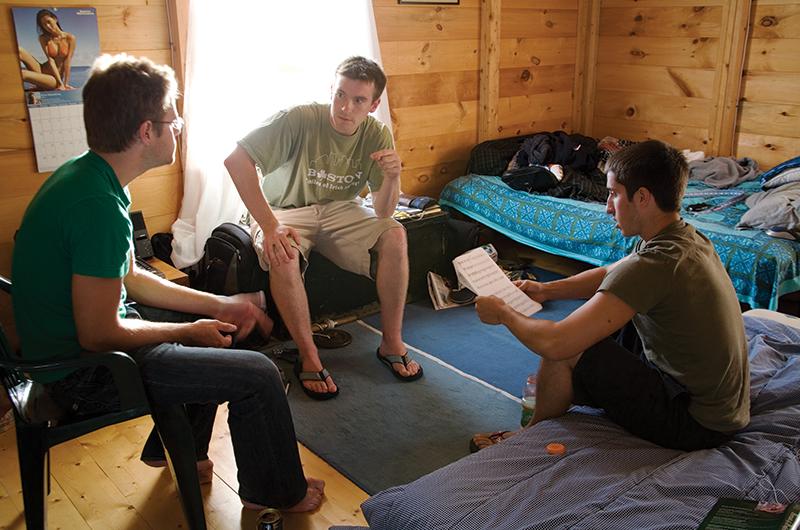
But for the group, it was also a summer rumbling with ambition. In six weeks, all those alumni – nearly half the men who’d ever sung with the Vineyard Sound, including most of the singers from the very first year – would return for the fifteenth reunion concert at the Tabernacle. The 2007 ensemble wanted to be ready for them with the latest, sharpest music and strong interpretations of the older stuff. (“It’s kind of like meeting George Washington, only musical,” said Billy Flanagan of the founders, before they showed up on reunion weekend.) And they wanted to sing it better than any edition of the Vineyard Sound had ever sung it before.
There’s some guys standing on the corner, singing that good old harmony.
If you want to identify the moment when the Vineyard Sound was actually born, you’d have to go back to the concert stage of the Garde Arts Center in New London, Connecticut, on the night of Tuesday, February 18, 1992. Bobby McFerrin had just given a concert, and Townsend Belisle, a junior at Skidmore College who sang with the all-male a cappella Bandersnatchers, along with Garth Ross and Chris Bettencourt of the Connecticut College Co Co Beaux, and Steve Roslonek of the Wesleyan University Spirits had mixed in with friends of McFerrin who were waiting for him to come back on stage after the show.
Before McFerrin, college a cappella – still thought of as corny even by many of the guys who were singing it – had been rooted in glee clubs and doo-wop, a form that emphasized four-part harmonies and velvety, unified background singing, as well as performances that resolutely valued the ensemble over a soloist and melody over rhythm. But in September 1988, McFerrin had scored a No. 1 hit with “Don’t Worry, Be Happy,” the first a cappella song ever to reach the top of the Billboard Hot 100, and he had gone on to win Grammy Awards for best song and best pop-vocal performance of the year by a male.
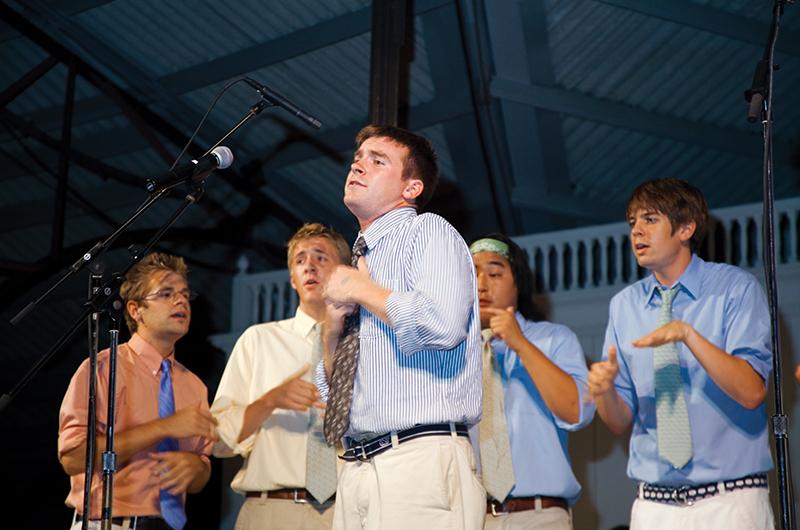
It took no time at all for college a cappella groups to crumple up much of the old sheet music and start afresh. Scores of new and reinvented college groups all across the country realized they too could vocally instrumentalize the background to a song almost note for note. They could imitate the strumming zhen-zhen of an electric guitar, the rattling chigga-chigga of maracas, the crying wah-wah of a tenor sax or trumpet. And a really talented vocal percussionist could mimic the thunder and splashes of a drum set in just about every musical genre imaginable, from pop to jazz to hip-hop.
College a cappella, which once had been all about the group and the blend, suddenly embraced the idea of a soloist swapping into and out of a team of vocal instrumentalists, who hung back and rocked out behind him. The college crowds were awed by how much the singers actually sounded like the instruments they were hearing on their CDs. A cappella singers were still nerds, to be sure – but nerds who could jump back and forth stylistically between a dazzling new vocal precision and the old and winning sense of glee-club silliness.
The summer of 1991, six months before the Bobby McFerrin concert, Townsend Belisle had been living and working on the Vineyard with Chris Bettencourt, an Edgartown kid from Connecticut College whom Townsend had met at a high school music festival. They both loved to sing and spent a good part of the summer wandering around town, barbecuing in the backyard, and meeting friends at the ferry, all the while drawing on their college repertoires to harmonize on songs like “More than Words” (sayin’ I lo-ove you) by Extreme. Passersby on the street liked it, girls on the beach liked it, they liked it.
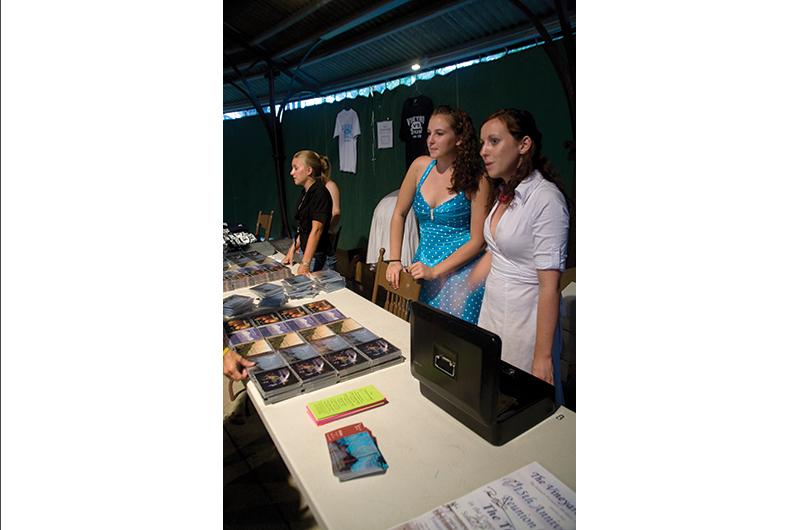
McFerrin came on stage to meet his friends. When he was done, Townsend and his chums stepped forward and asked the star to sing a song they’d worked up the background for. The song was “Baby,” off of Medicine Music, McFerrin’s latest album. Townsend says, “My part had a different syncopation than the other three. And I was so nervous that I wasn’t getting it right before Bobby starts singing the solo. So Bobby literally leans over and starts patting my chest. Like: ‘Here’s the beat. Follow right here. Here’s the syncopated part. You got it. Just hold to it.’”
Right about then Townsend settled on the idea that had been rattling around in his head since summer: He and his friends ought to bring this traditional – but now rapidly evolving – form of close-harmony singing down to the Island. “‘What do you think about going to the Vineyard for the summer?’” he asked his fellow singers as they walked back to their cars. The four McFerrin attendees agreed and invited six other guys from the three schools to join the nascent group. “They were all quickly on board,” says Townsend. “Very quickly.”
And as I rise up from the shadows, and my voice carries down the street.
The 2007 edition of the Vineyard Sound arrived on the Island on June 1. Ten young men from six colleges gathered that evening in the living room of a handsome, squarish house on a scrubby hill near the airport. They were ready to work. For one thing, each singer arrived owing $2,550 up front, his share of the rent. Most of the guys wrote a check, using their own money or borrowing from parents. For two or three, there was just no way to hand over that kind of money on the first of June; a percentage of their take from the performances was docked each week until they settled up with the group. By the first of August, they earned enough from the shows to cover the rent, and the money earned in the first two weeks of August, leading to the final concert at the Old Whaling Church in Edgartown, was free and clear. (A couple of them worked an extra job to supplement their incomes.)
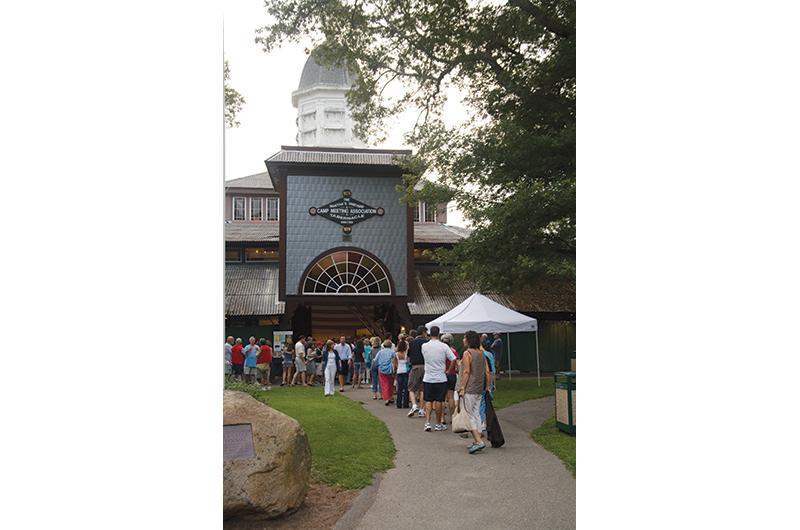
The 2007 ensemble lived and worked together in much the same way as the Vineyard Sound singers who had gathered for the first time back in ’92. (For the record, there was no group in 1998, although there was a reunion show that summer.) They rehearsed from after dinner to midnight in the living room of the house. They walked and sang their way like warbling Pied Pipers through town an hour before each concert, drawing parents and children and young women (and occasionally their reluctant-looking boyfriends) to the show. They enjoyed the Island the way college kids always have – going to the beach, meeting friends they made after shows or during their explorations of the Vineyard, and partying after work. And they did all this without any supervision by an outside manager or even any formal leadership within the group.
Well, these were a cappella nerds, after all. “We were ten fun, warm, sensitive, clean-cut guys. We weren’t the type to soak the rug,” says Townsend Belisle of the first group. “There was enough of a commonality that kept us from having to have those conversations to keep each other in check. A concrete goal, but not a pinpoint goal.” Elijah Carroll, the only other Islander besides Chris Bettencourt to sing with the Vineyard Sound, agrees about his years of 1999 and 2001: “You had to really care about each other, and care about the group enough to invest yourself in it.For me in 2001, it was so easy to do that, just be all in, to embrace the guys, to really become a happy little singing family.”
On the second night in residence, the 2007 group began to audition solos for the repertoire they’d inherited from previous years of the Vineyard Sound and the new songs they would introduce that summer. There were veterans and newcomers from the Skidmore Bandersnatchers (David Baker and Tatsuya Adachi) and Wesleyan Spirits (Owen Bennion and Allie Levey). There were returnees from the William and Mary Gentlemen of the College (Billy Flanagan), Emory University No Strings Attached (Brendan Dolan), and Eastern Connecticut State University Tonal Recall (Jeff Drew). And there was one second-year man (Dan Carroll) and two rookies (Ryan Earls and Matt Prior) from the University of Connecticut Conn-Men.
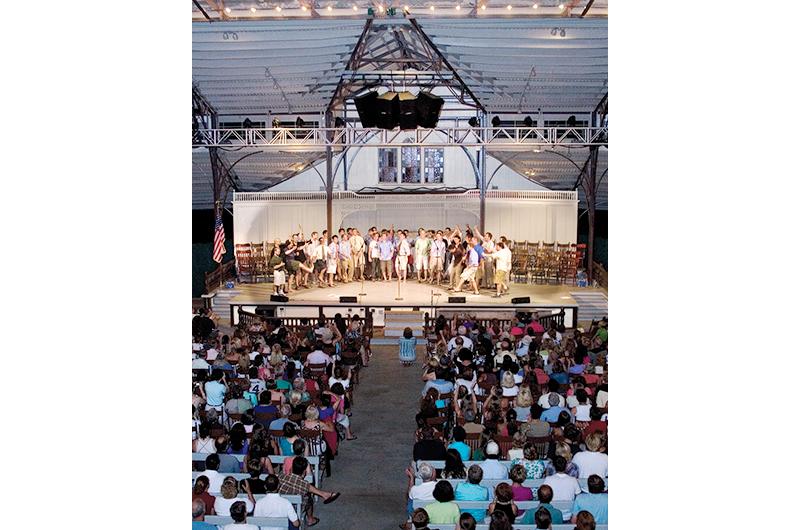
Three hours into the fourth night of rehearsal, Allie Levey, a rookie member of the group, sat on the front stoop during a break. He looked a bit winded. “The Spirits usually learn about five brand new songs every semester,” he said as his fellow singers chatted in the kitchen, just on the other side of an open window. “We’ve done fifteen in four rehearsals. And the songs are almost done. These guys are all the cream of the crop. It just happens to be that the groups we choose from have really well-established reputations at their own schools, so the Vineyard Sound gets the best of the best....The Vineyard Sound is better than any single group at any college in this country – I’d bet my life on that. Just because we have really good people who concentrate time and turn out something really special.”
The fact that three guys came from the Conn-Men was something new. Never before had the Vineyard Sound taken so many singers from a single school that wasn’t one of the original three. The Conn-Men, a fairly new group in the world of college a cappella, were taking the post-McFerrin ideas of instrumentation and solo singing to new extremes.
“Most of our arrangements were direct copies of songs,” says Jeff Drew, a second-year tenor with the Vineyard Sound, who sang with the Conn-Men before transferring to Eastern Connecticut in 2006. “You would listen to the parts, the electric guitars and the drums, and [the arranger] would write that down as opposed to making up new parts. There wouldn’t be ooh’s and aah’s.” The Conn-Men also sang with individual microphones to accentuate the notes and make the songs loud. “We just wanted to rock. That’s pretty much all we wanted to do,” says Jeff. A typical Conn-Men set list includes recent hits from Radiohead, Tenacious D, and Maroon 5. Right away, the influence of the Conn-Men began to nudge the Vineyard Sound further down a pathway it had long been traveling – toward an emphasis on precise, inventive vocal instrumentation and rock-star solo singing.
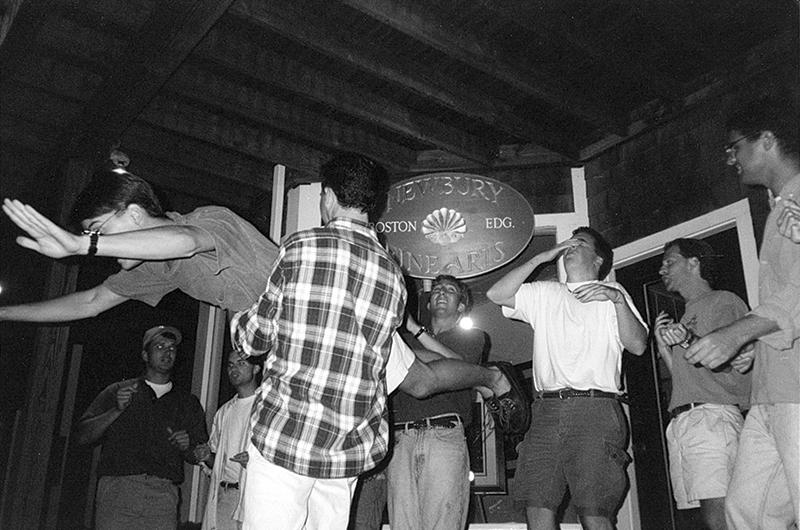
And by the time the reunion concert rolled along at the end of July, audience members who’d followed the group from the beginning were saying that the Vineyard Sound had never sounded so accomplished or individually so strong.
I’m alive, and I’m proud to be just singing that good old harmony.
After the reunion concert – nicknamed Acapocalypse by the 2007 group – several of the original alumni agreed on the virtuosity of the latest singers. “The music was so unbelievable,” said Garth Ross, a founding member. “They could not have been more accurate – the most musically accurate of any [Vineyard Sound] group I’ve ever heard. And some of the soloists are just stunning.”
But in moving so far down the road of vocal instrumentation and stellar solos, a few veterans felt that something of the original spirit of the Vineyard Sound was getting lost. The first groups, thinking like an ensemble first, put together skits between songs and even interrupted a number to show how the background harmonies worked. Inventing their set lists as they went along, they shied away from the idea of a single music director and taught each other songs from their own repertoires. Lacking, to a degree, the incendiary vocalists of the 2007 group, the founding members had returned again and again to the whole question of what each song was actually trying to say and do, says David Buffum, a charter member. As a result, the skill of those early groups at “actually interpreting a song was much richer. Because that’s what we had to grow with.”
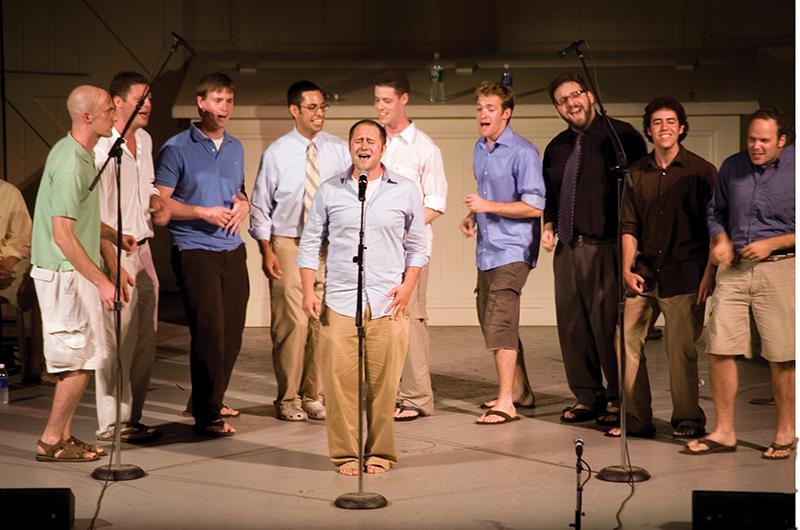
By contrast, the 2007 singers were thinking less like an ensemble and more like all-stars who took turns being front men and backing musicians. They kept things serious for clearly serious numbers – Allie Levey’s yearning “I Can’t Make You Love Me,” by Bonnie Raitt, or Ryan Earls’s despairing “Empty Garden,” Elton John’s memorial to John Lennon – but they often pushed hard to sell songs that might have sold themselves. (“They mimed pistols and halos during there ain’t no good guy, there ain’t no bad guy on ‘We Just Disagree,’” says one alumnus. “You don’t need to do that.”) As rehearsals went on through the summer, the 2007 singers never really addressed questions of stagecraft as a group or discussed whether a song could be trusted to tell its own story. “The audience doesn’t know the song sometimes,” says Ryan Earls when asked about the disposition to ham things up on so many numbers. “We have to let them know how they should be feeling. The only way to do that is basically just to act it out, kind of force it.”
And by the end of the summer, the guys were tired and a bit cranky. The house was small, the cleanup routine in disarray, and the relentless drive for musical perfection had been exhausting. Andrew Lefkowits, who flew in from Paris for the reunion concert, said later that fall that he understood. “In the summer of ’01, it was a little like that as well. I came in with a lot of really high expectations, and as the musical director and business manager, had some unreasonable demands,” he said. By the time of the final concert, “I was pretty fed up. I was sort of done with a cappella, done with the whole scene, certainly done with that group.” But the last concert on a beautiful night at the Old Whaling Church in Edgartown that year, sung before a sold-out house of more than five hundred people, turned it all around for him. “I remember we were singing ‘Black Sheep’ – Will Sullivan was singing it – and I remember having the feeling, ‘Yes. The summer is redeemed. Just from this one moment here that we’re all sharing and all contributing to.’”
Singing that soul to soul, and brother to brother: a cappella, it sounds good to me.
So it was for the 2007 group and its own standing-room-only, rocking finale at the Old Whaling Church on August 19. Several of the young men knew that time was passing and that this was to be their final night with the Vineyard Sound. On the porch after the show, between the tall columns of the church, they laughed with parents and classmates who’d come for the concert, mingled with young women they’d met, talked about commercial fishing trips they’d taken with Captain Greg Mayhew of Chilmark, the parties they’d sung for, the celebrities they’d met, the little kids who’d picked them out of a checkout line at the supermarket. They joked about whether they’d be able to afford the price of a ferry ticket for the twentieth reunion concert in 2012.
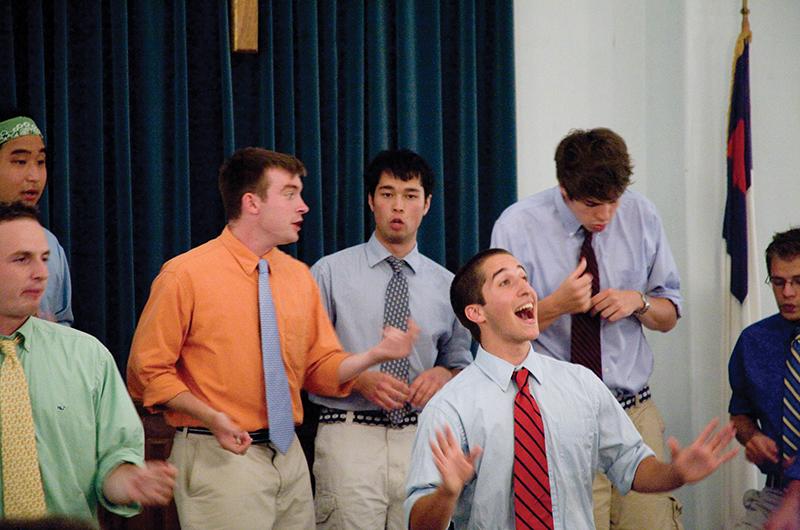
Brendan Dolan, who was singing “Captain’s Song” when Andrew Lefkowits scurried across the stage behind him six minutes into the reunion concert just three weeks before, is pre-med and a Latin American studies and Caribbean studies major at Emory University. He already knew his academic career would take him elsewhere in the summer of 2008. From the porch, he looked over the crowd in wonder and thought about the summer just past.
“I did that?” he said. “People recognized me on the street. They would ask me to take pictures with them. I signed autographs. I partied with celebrities. And I was just singing? It’s incredible. I would never have ever pictured myself doing this. After my freshman year of college, I was painting houses. I was working a job, sweating my ass off thirty feet up in the air, bees flying all around me, with a guy who was sort of a burned-out drummer. Never made it. He was a musician, and he had to settle down. You look at that, and the next summer I’m out here, singing for a living?”
He shook his head and smiled. “Get real.”
Dan Carroll: A Human Drum Kit
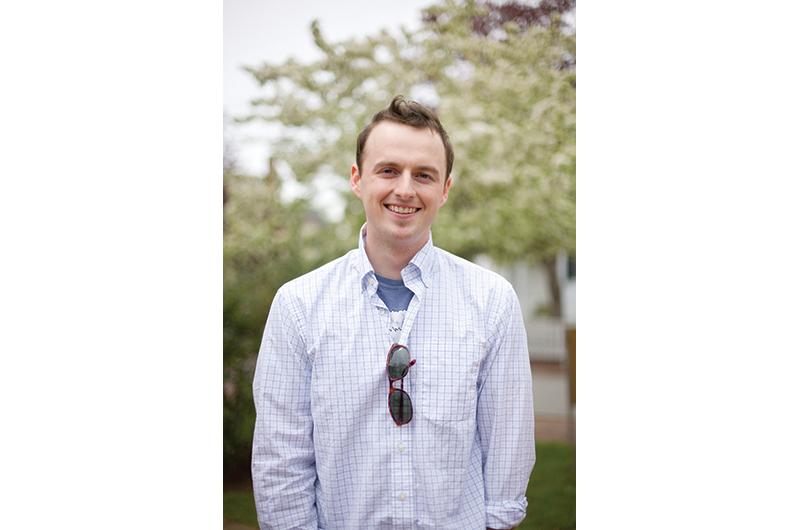
Ask a devotee of old-time college a cappella what startles him most about the singing these days, and he’ll talk first about the vocal percussion. And nothing better shows off how differently the Vineyard Sound sings today from the way it did fifteen years ago than the advent of what the singers themselves call “perc.”
If you attended the final Vineyard Sound concert at the Old Whaling Church during the inaugural summer of 1992, what little vocal drumming you heard was handled at different times by three or four guys who rarely ventured beyond the dum-tss, dum-dum-tss-tss of the most elemental rock-and-roll beat. But listen to the compact discs from 2006 and 2007, and on nearly every track you’ll hear a specialist, Dan Carroll, at work.
Dan grew up in what he often describes during shows as “a little slice of heaven called East Hartford, Connecticut.” He got interested in music in high school and discovered a talent for imitating whipping, urban, electronic sounds, which is known as beatboxing. “I could always, like, joke around,” says Dan. “There’d be guys rapping and stuff in the hallways.” Dan would throw in a beatbox rhythm, “and guys would start rapping over it.”
He joined a jazz ensemble his senior year, and that year Five O’Clock Shadow, a Boston-based a cappella rock group, came to the school. During a seminar the percussionist asked if anyone in the audience could do vocal perc. A friend raised Dan’s hand. “I got up there, and I could actually hang with this guy,” says Dan. “I was like, ‘This isn’t bad.’ I ended up talking with the guy, and we did a song to open for them that night.”
With the Vineyard Sound, he mimics what he calls “just your basic Ringo Starr drum kit.You have your crash cymbal, which is pshhh! And then you have your bass drum: p-fhum, p-fhum and snare drum: pff-pff. You have a set of toms,” here he pretends to strike the drums, going from a higher tone to a lower one, “pm-pm, pm-pm, pm-pm – depending on how many you want to use, depending on the song.” For the high-hat cymbals, he produces two sounds: open (tss) and closed (ts).
Unlike the singers, who mostly learn from sheet music, Dan works out the percussion in rehearsal. “Sometimes we’ll do songs here that I’ve never heard before,” he says. “I just put a drum part to it.If I needed to make up something on the fly, it wouldn’t be a problem. I can adapt pretty well.”
An hour-long show can exhaust him. In addition to the two songs he sang last year – “Insomniac,” by Billy Pilgrim, and “Only the Good Die Young,” by Billy Joel (one of his favorite singers) – he’ll handle the perc on as many as ten other numbers. “It beats up on your vocal chords much more than regular singing would, I think. It’s because of the impact. There’s nights where you can’t even talk anymore. You just go right to bed. ChapStick and water.”
In December, Dan graduated from the University of Connecticut, having attended three colleges and declared eight majors (he got his degree in communications). He returns to the Vineyard Sound for a third summer this year, his first as business manager. Along the way, there was only one thing he never learned how to do: play drums. “It’s really sad,” he says. “I sit down to a set, and all I can do is” – and here taps timidly on an imaginary cymbal – “ting-ting-ting.”
Where are they now?
Here’s what several Vineyard Sound alumni have been doing since the summers they sang with the group:
Tim Aslin (1999–2001): Works as an actor in film and television. Latest film, Heist, will be finished this summer. Writes music and performs in Los Angeles, often with Peter Wetzel, another Vineyard Sound alumnus.
Townsend Belisle (1992–1995): Created Haystack Needle, a contract business–development firm working with creative companies and artists, among them several bands, including John Legend and the a cappella group Naturally 7. Founded and continues to produce the Hyannis Sound, a summertime college a cappella group based on Cape Cod. (haystackneedle.com)
Javier Bernard (2004–2006): Works freelance in television, most recently for the Food Network, CNN, and Viacom/MTV. Recently recorded an extended-play (EP) album with producer and engineer Roger Fife. (myspace.com/callmejavi)
Chris Bettencourt (1992–1993): With Elijah Carroll, one of two Island natives to sing in the Vineyard Sound. Serves as director of Merrill Lynch in Wisconsin. Lives in Mequon with wife Jessica and three sons. “While I don’t get to perform for crowds like we used to, my children are now my audience and often my lead singers.”
Sam Bigelow (1997 and 1999): An admissions officer for Boston University who also works as a pianist and singer/songwriter, playing mostly in Cambridge and New York. His band last year released The Foundry, an album produced by fellow Vineyard Sound alumnus Anand Nayak (iTunes.com). Nominated last year as outstanding blues/soul act by the Boston Music Awards.
David Buffum (1992–1996): Dean of students at The Field School for seventh-through-twelfth graders in Washington, D.C., where he teaches music; his use of a cappella in the classroom was recently featured in an online article for American Music Teacher (www.encyclopedia.com/doc/1G1-131128776.html).
Elijah Carroll (1999 and 2001): With Chris Bettencourt, one of two native Vineyarders to sing with the Vineyard Sound. Works for the musical revue Beach Blanket Babylon in San Francisco and interns for jambase.com, a concert-listing website. Writes and produces original music. Sings in the four-man a cappella group Too Small Top Hat with Vineyard Sound alumnus Erik Grimaldi and with the Disastraunots, a hip-hop duo. (myspace.com/toosmalltophat and myspace.com/disastraunots)
Dylan Connor (1997): Lives in Bridgeport, Connecticut, and teaches Latin at Bunnell High School. Also writes for and plays with an eponymous indie power–pop band in Massachusetts, Connecticut, and California. (dylanconnor.com)
David Cope (1995): Lives in Philadelphia and in March released a new self-titled album of pop songs, available on iTunes. (myspace.com/davidcope)
David Fountain (2002–2003): Works as a studio musician and writes and produces for bands around Atlanta. Plays trumpet, mandolin, lap steel guitar, and sings backup for Wighat; and guitar, keyboards, and vocals for It’s Elephants. As a solo artist, recently released an EP The Happy Tastes Like the Sad (iTunes). Expects to release a second EP this fall. (myspace.com/davidmos)
Shane Fuhrman (2001–2002): Recently admitted to the bar and working in the finance-practice section of the law firm of Pillsbury Winthrop Shaw Pittman LLP in New York City. “Music is still a large part of my life, but I no longer perform. I have a number of friends in the music industry that help me to stay up to date with local artists.”
Erik Grimaldi (1997 and 1999): Co-produced compilation albums to celebrate the tenth and fifteenth seasons of the Vineyard Sound. Collaborated as a producer and manager with fellow Vineyard Sound alumnus Dylan Connor for the former rock band M.Headphone. Sings in the four-man a cappella group Too Small Top Hat with Elijah Carroll in San Francisco. (myspace.com/toosmalltophat)
Sean Han (1999–2000): In 2006, founded Blip Blip Bleep, a group grounded in synth pop and indie rock, now playing clubs in New York City and the northeast. The group’s second EP, Alarm Clock, Snooze Bar, Get Up, was released in April. (blipblipbleep.com)
Joachim (Yo) Horsley (1999): With his company LittleHorse Music and Audio in Manhattan, writes music for film, TV, and new media, and creates sound effects and mixes for film and television. Also writes arrangements for ensembles, including orchestras, rock bands, and a cappella groups. Song “I Want Your Love” off his most recent album Strangers in the Valley won the grand prize (pop category) in the 2007 John Lennon Songwriting Contest. (littlehorsemusic.com)
Andrew Lefkowits (1999–2001): Sound engineer for Naturally 7, an American a cappella group that tours Europe, Asia, and North America up to two hundred days a year (www.naturallyseven.com). Also works as a freelance studio engineer through Lefkowits Audio in San Francisco. Records Vineyard Sound final concerts each summer, which are released the following year as a live album. Serves as the president of the group’s board of directors.
Dan Lennon (1994–1995): Serves as director of advancement at Notre Dame High School in Lawrence. Sings with two Boston-based a cappella groups: Firedrill! (firedrillband.com) and Five O’Clock Shadow, which sang at the halftime show at the NFL Hall of Fame games in 2001 and 2005 (focs.com).
Sam Martin (2002–2005): Branch manager for Enterprise Rent-a-Car in northern Virginia, and spends his free time playing golf, racquetball, and paintball. Serves as treasurer of the Vineyard Sound.
Jeremy Nash (2003–2006): Works on his music career in New York City while handling an assortment of day jobs. (“Different island, same old story.”) Released an acoustic self-titled album (available on iTunes) and plans to produce a full-band disc this year. (myspace.com/jeremynash)
Anand Nayak (1994): Producer who has worked with Vineyard Sound alumni David Fountain (The Foundry) and as a co-writer and producer of Steve Roslonek’s recent albums for children. Lives in Florence, Massachusetts, with son Jack and wife Polly Fiveash, with whom he occasionally performs. Also plays guitar and sings with Rani Arbo & daisy mayhem, a neo-traditional string band that tours nationally. (myspace.com/dizzydogmusic)
Josh Peck (2001 and 2003): Works with Pulse Music in New York City as a writer and producer for records, film, and television (pulsemusicny.com). Recent credits include music for Mercedes-Benz, Callaway Golf, and Chevrolet television commercials, an orchestral score for the short film The Boundary, and the mix of a track for a female-vocal driven rock band called the Hotcakes.
Steve Roslonek (1992–1993 and 1995): Performs widely as a singer and songwriter of children’s music through SteveSongs, and joined PBS Kids as musical co-host of Kids Morning Preschool Destination in May. Often performs and records with Vineyard Sound alumni Anand Nayak (producer and co-writer), David Buffum (co-writer), Sam Bigelow (piano), Matt Steckler (saxophonist), and singers Dan Lennon, Dave Cirone, Paul Samford, Chris Bettencourt, Andrew Lefkowits, and Paul Foster. First DVD, Marvelous Adventure, will be released through Rounder Records in August. (www.stevesongs.com)
Garth Ross (1992–1993): Director of the Kennedy Center’s Performing Arts for Everyone Initiative, producing programs such as the Millennium Stage, Free Performance Series, and Holiday Festival. “I have also started a monthly music party with neighborhood families, as a supplement to the musical education our kids receive in their public school.”
Jon J. Ryan (1992–1995): Beatboxer (vocal percussionist) for Ball in the House, a Boston-based vocal band rooted in rhythm and blues and soul. “I started the band after my Vineyard Sound experience showed me that you could make money performing music, and we now perform full-time and tour nationally.” (ballinthehouse.com)
Matt Steckler (1997): Saxophonist and flautist who writes for and plays with Dead Cat Bounce, a jazz ensemble based in New York City (deadcatbounce.com), as well as other groups in the Northeast, including Persiflage and the South End Ramblers. Has performed with fellow alumnus Steve Roslonek of SteveSongs.
Ian Varley (1997): Computer programmer and full-time student in the master’s program for software engineering at the University of Texas at Austin. Plays and tours regularly with the funk jazz band Drop Trio, which is recording an album this year. Does session work and plays as a sideman for several other groups, some of which also tour. (ianvarley.com)
Ari Wolfe: (2000–2003): Director of the Princeton in Asia program, which sends university graduates to do service work in the Far East. At Princeton, sings traditional music (sacred and folk) from the republic of Georgia and the region of the Caucuses with a small group of doctoral candidates in musicology and composition. Serves as secretary of the Vineyard Sound board of directors.
Where and when do they perform?
Mondays, 8 p.m., Trinity United Methodist Church, Oak Bluffs; Tuesdays, 8 p.m., Chilmark Community Church; Thursdays, 8 p.m., Federated Church, Edgartown; Fridays, 7 p.m. and 9 p.m., St. Andrew’s Episcopal Church, Edgartown (except July 4); Sundays, 11:30 a.m. to 1:30 p.m., brunch at Lola’s Southern Seafood, Oak Bluffs. Special concerts: July 25, 8 p.m., Tabernacle on the Camp Ground, Oak Bluffs; August 16, 8 p.m., Old Whaling Church, Edgartown. As of this year, Vineyard Sound A Cappella Inc. is a registered 501(c)(3) not-for-profit organization. Suggested donations are $8 per adult, $5 per child. For more information, visit www.vineyardsound.org.

